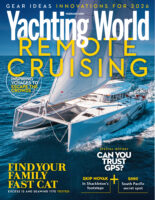Mike Golding leads Open 60s, and multihull start is delayed as the wind backs to the west and wave heights of 10m are forecast in the Channel
Yesterday the monohull fleets of the Transat Jacques Vabre – the Open 60s and Open 50s – as well as the smaller multihulls got off to a fast start from Le Havre. Strong winds are forecast for today, particularly as the cold front passes, when a mean wind speed of 45 knots and wave heights of up to 10m are forecast in the exit of the Channel.
The decision was also taken to delay the start planned today – as well as the course – for the ORMA 60 trimarans, which would otherwise have had to face the brunt of the conditions within the confines of the Channel. Here is what the press report says:
‘ “It will be unreasonable to send the trimarans out in such conditions, even if the skippers are capable of managing the boat through 40 – 45 knots of wind. The English Channel is very narrow, there is no escape from these conditions and the shipping traffic is heavy,” announced Gerard Petipas, organiser and race director for the Transat Jacques Vabre. “We will know more tomorrow morning, if the conditions will allow us to start the fleet on Tuesday or Wednesday morning. It is already clear however, that the boats will not be leaving before Tuesday.”
‘In this situation the race organisation have decided also to change the course for the multihull fleet and take out the Ascension Island mark so that given the extra days’ delay, the multihulls and monohulls will still arrive in Brazil together.’
Meanwhile, out on the water, Mike Golding and Brian Thompson answered some questions about the capabilities of Golding’s new Open 60 by storming away from their competitors overnight. Yesterday Golding explained his strategy in a press report:
“Looks like we’re starting in fairly reasonable conditions, with quite a clear flow and a steady 15-20 knots. As we head to the west the breeze will increase, and shift to the left, which I think is going to mean tactically, its going to pay to be covering the left-hand side, which means close to the coast, close to Cherbourg. If we make sure we are right side of shift, the upwind start could sort out some the fleet.
“Then the conditions seem to clock round to the southwest, so it’s going to continue to be on the wind. As conditions are right now, it looks like the Doldrums are very far north and there are no trade winds whatsoever, which could mean upwind conditions for a very long way, so right now we’re looking at the food more carefully as we could be out there for up to 20 days! It does look potentially like quite a slow race, not with no wind, just with headwinds.”
In the midst of the pack are Emma Richards and Mike Sanderson on Pindar, also much fancied for a podium place on this race. But Emma has fresh memories of sailing through a severe depression off the coast of Portugal in Around Alone last year and had this to say about what lies ahead:
“We have spent the past six months getting ready for this race, but no amount of preparation can prepare you for the conditions we’re going to face as we head out across the Bay of Biscay. When I looked at the latest weather chart this morning I realised just what we’re up against.
“We have to sail though a deep depression with winds of 40 knots. And when you combine these conditions with the ‘Biscay factor’, there is no doubt that for the next two days we are going to have to be in survival mode. It’s almost as if the Atlantic Ocean is sending me a message: ‘Welcome back Emma’.”



